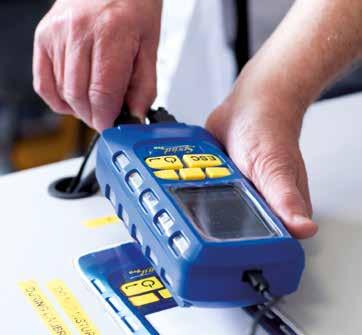
3 minute read
Why servicing is so important
Why is servicing important?
Ensuring the ongoing function and longevity of an FGA is in the detail, says Lynsey Tamlyn, international marketing manager at Crowcon.
Making sure that you have an operational, well-maintained flue gas analyser is of the utmost importance. Without an efficient analyser, your capacity to carry out your work and deliver a reliable and safe service to customers is severely hindered.
FGAs are crucial tools because of their capacity to sample the flue gas of a working appliance and then measure the critical gases produced during the combustion process. These measurements enable you to gauge the appliance’s operational efficiency, as well as its safety levels.
By abiding by certain best practices, professionals in this sphere can remain proactive, safe and successful.
The importance of servicing
Without proper servicing, this essential piece of kit becomes obsolete. Bearing in mind the essential and safety-related nature of the use of FGAs, it is imperative that it is well maintained, with a current and valid certificate of calibration.
All FGA manufacturers recommend an annual calibration and service at the very least. But if you suspect there are issues with the instrument at any other time, then always contact your FGA supplier for assistance.
During regular services and calibration, the instrument’s consumable components are checked to see that they have enough life in them to last to the next due date.
Regular checks
Bearing in mind the climate in which you are working, FGAs are likely to get cold and damp if they are left in a vehicle overnight. It’s important to not store your FGA in this manner to avoid condensation forming and causing water damage. Removing the analyser from your vehicle overnight also reduces the risk of theft.
As well as remaining vigilant in terms of storage, another way to ensure a healthy FGA is to regularly check the filters. Clearing out the instrument’s water trap regularly is a must as this is the primary cause of damage and downtime in flue gas analysers. Damage can occur because water is a by-product of combustion and can get sucked into the FGA each time a test is undertaken.
FGAs come with inbuilt water traps and filters to protect from this damage, so check and empty them regularly, alongside making sure that the filters are in optimum condition and replaced when required.
Moisture build-ups lead to low readings because the sensors have a film of condensation over them which, in turn, stops the flue gas reacting with the chemicals in the sensors. Moisture can also cause the pump to not perform correctly due to water contamination. Placing the FGA near a radiator or in a warm room will raise the instrument to room temperature and often resolves any issues.
Annual calibration matters
When the time comes for your FGA’s annual calibration, the prospect of sending away a vital piece of kit can be unappealing. But don’t put it off: failing to service your FGA could result in the loss of your professional reputation, your job – or worse.
Ignoring the need for calibration means overlooking an FGA sensor degradation. The sensors inside FGAs react with the very gases they are there to detect, which cause problematic wear and tear. Over time this leads to degradation and causes issues such as inaccuracies in its readings.
Alongside this erosion of function, as is the case with all equipment, parts can fail. A poorly performing, uncertified and uncalibrated FGA could fail to detect an issue, leading to the potential for you failing to exercise the expected duty of care to your customer.
If your analyser is showing any signs of failure, even before your next calibration due date, always book it in promptly. Service and calibration will ensure that it responds accurately to gas, and that all its components are replaced as and when they need to be. ■
www.crowcon.com





